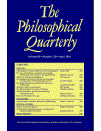KNOWLEDGE ASCRIPTIONS AND THE PSYCHOLOGICAL CONSEQUENCES OF THINKING ABOUT ERROR
Abstract
Epistemologists generally agree that the stringency of intuitive ascriptions of knowledge is increased when unrealized possibilities of error are mentioned. Non-sceptical invariantists (Williamson, Hawthorne) think it a mistake to yield in such cases to the temptation to be more stringent, but they do not deny that we feel it. They contend that the temptation is best explained as the product of a psychological bias known as the availability heuristic. I argue against the availability explanation, and sketch a rival account of what happens to us psychologically when possibilities of error are raised.




